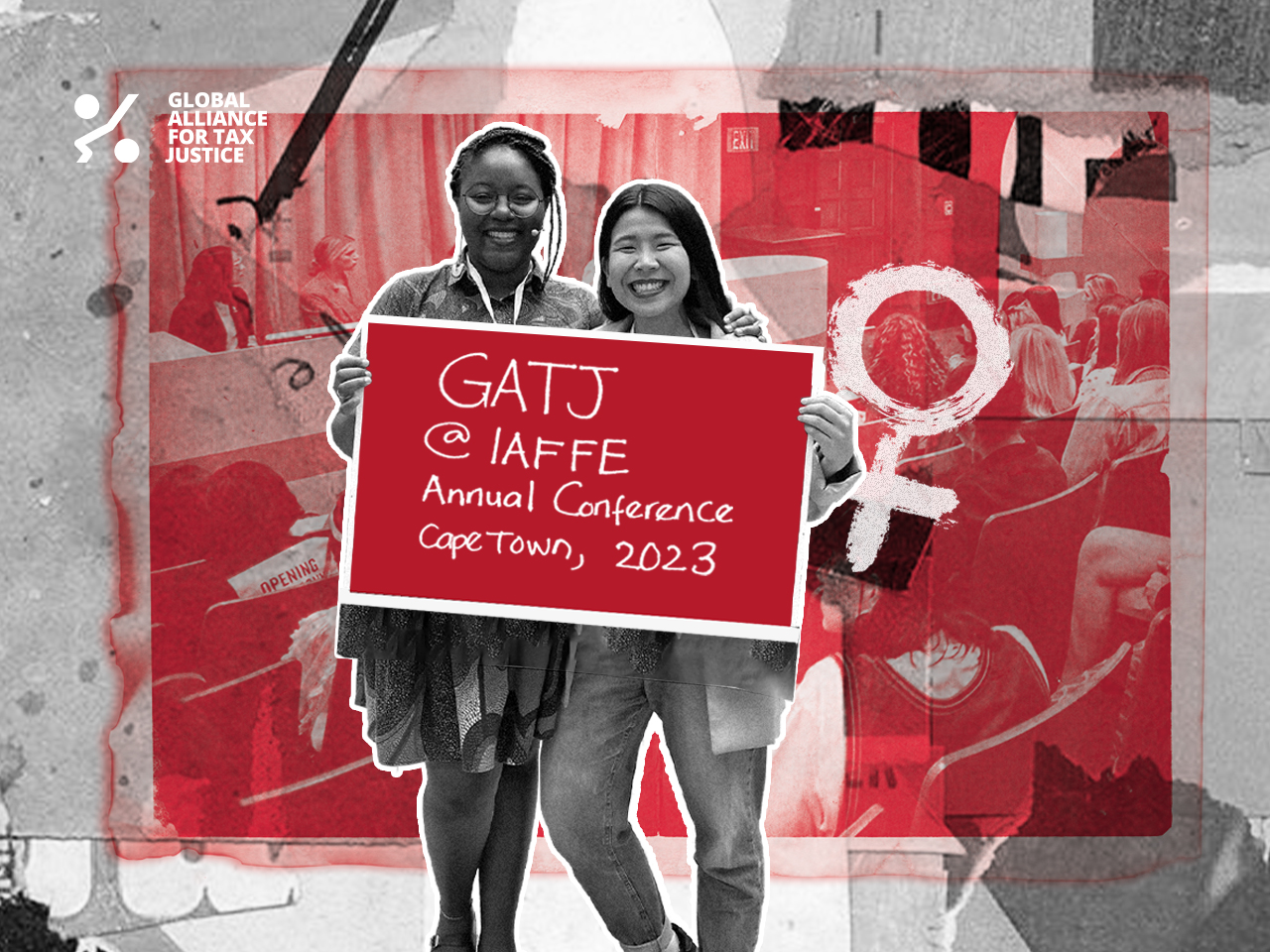The Global Alliance for Tax Justice (GATJ) is proud to participate with members of its Tax and Gender Working Group (TGWG) in the 31st International Association for Feminist Economics (IAFFE) Annual Conference, taking place from 5 to 8 July 2023, in Cape Town (South Africa). The GATJ delegation will follow the discussions with a special attention to financing for care, which is a core theme for the TGWG.
“At the Tax and Gender Working Group, we prioritise the issue of care because we understand that the gendered impacts of tax policies are not limited to the tax realm. They go beyond implicit and explicit biases in tax policies, including critical aspects of spending towards gender-transformative public services and social programmes that redistribute the burden of care that is disproportionally carried by women and girls around the world, ” said Âurea Mouzinho, policy advocacy and campaigns coordinator at GATJ and co-chair of the TGWG.
Mouzinho will approach the connection between tax justice and care in the panel “Time is now: strategies and pathways for forging feminist economies”, organised by ActionAid as part of the conference programme. The session will be on 7 July at 1:50 pm SAST, and is only open to those who registered previously to the event.
“The mainstreaming of care discussions within the feminist agenda is a reflection of the incessant work feminists have done over decades to call into attention the neglected reproductive sphere and its adverse consequences on women, specifically, and societies more broadly.”

3 resources with a feminist perspective on tax and care
The GATJ team selected three key resources for those who want to better understand the intersections between tax justice and care. Check them out:
Publisher: Public Services International (PSI)
Authors: Corina Rodríguez Enríquez and Cecilia Fraga
This PSI study points out that the mainstream approach to care work centres its contribution to the overall productivity of the economy.
Going beyond this purely economic framing, the authors recover the concept of social organisation of care (SOC), which refers to how care needs are fulfilled by the conjunction of households, the State, the market and the community. Having the SOC as the starting point of the analysis, the report takes a closer look at policies and statistics related to organisation of care arrangements in eight countries: South Africa, Kenya, Canada, Argentina, Austria, Poland, India and Australia.
The study concludes with recommendations towards a more equitable and accessible social organisation of care. These include: guaranteeing adequate remuneration for care jobs, stronger social protection for care work, extending and strengthening parental leave for both women and men, creating mechanisms to extend care leaves to informal or self-employed workers and to reduce legal working hours as a way to ensure all workers have more availability for care tasks in the household.
Publisher: Oxfam
Authors: Amber Parkes, Anam Parvez Butt, Sharmishtha Nanda, Roula Seghaier, María del Rosario Castro Bernardini and Verónica Paz Arauco, under the coordination of Julie Thekkudan
Oxfam’s Care Policy Scorecard is a tool that enables policy makers, researchers and civil society organisations to track government policies related to care in national contexts, identifying progress and gaps to improve the recognition, reduction, redistribution, representation and rewarding of care.
The Scorecard tracks policies for unpaid care work, paid work and intersectional policies to support both paid and unpaid care. Specific policies the Scorecard tracks include care-supporting physical infrastructure, care services, social protection benefits related to care, care-supporting workplaces, labour conditions and wage policies, workplace environment regulations, migrant care workers’ protections, workers’ right to organise, social norms interventions, measurement frameworks and data collection.
Financing for care work is covered transversally in each index, taking into consideration whether sufficient resources are allocated to ensure the policy meets its objectives in terms of the distribution of care.
Publisher: Akina Mama wa Afrika (AMwA)
Presenters: Lyla Latif, Jessica Mandanda and Joanitah Najjuko
In this podcast, the presenters point out that many tax regimes in place nowadays put more pressure on the most vulnerable people, who are primarily women and girls. They are disproportionately affected when governments raise taxes on basic needs (such as food and fuel) to mobilise more resources to pay for the public debt.
According to Latif, tax justice advocates are calling for a wealth tax that would be levied on the net value of all assets that exceed an specific threshold. Charging a 5% rate on the assets of all 2.660 billionaires, who have a combined wealth over US$ 13 trillion after all deductions, would raise US$ 650 billion, the equivalent to 89% of all debt of African countries. “This is why we need to discuss wealth taxation and why feminists need to advocate for it,” she argued.
“When it comes to the human rights element of it, when we’re talking about cultural, social and economic right of the people, the way that the tax regime currently functions heavily infringes the human rights of a lot of people, especially women, because it created an environment where nobody can thrive and nobody has access to the most basic standard of life,” underlined Mandanda.
The advocates also highlighted the need to recover the values of Ubuntu to “promote a community-centric ethos” where those who have more, pay more, meaning that governments should make sure the ultra rich pay their fair share of taxes.
